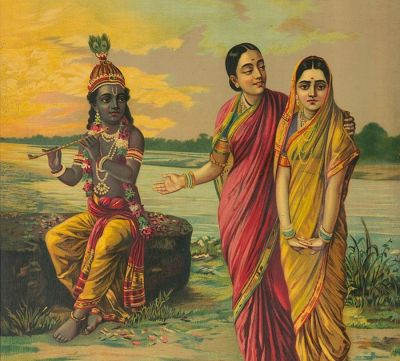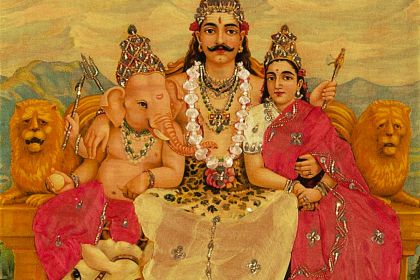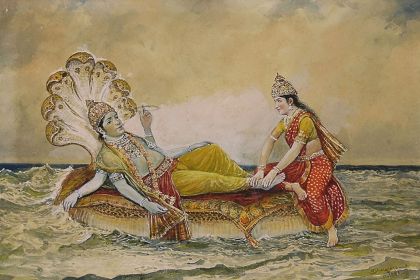MEDITATION
Hare Krishna Mantra: meaning and purpose of best-known Hindu chant

Radha Krishna (Manini Radha) by Raja Ravi Varma
The Hare Krishna mantra is a highly popular religious chant in India, the original lyrics of which can be traced back to 500 CE. Currently, the mantra is so widespread around the globe that it is rightfully considered to be the best-known Hindu chant and generally the most famous Sanskrit text.
The song consists of only three words which are the names of Vishnu—one of the principal deities of Hinduism who, in alliance with Brahma and Shiva, forms the triple deity personifying the cosmic functions of creation, maintenance, and destruction. In this triad of deities known as the Trimurti, Brahma is postulated as the creator, Vishnu as the observer, and Shiva as the destroyer.
The incredible popularity of the Hare Krishna mantra can largely be explained by the simplicity of its poetic stanza composed of four eight-syllable lines and featuring the trochaic meter—a fairly common form in nursery rhymes.
Here are the original lyrics first mentioned in the Kali-Saṇṭāraṇa Upaniṣad:
Hare Rāma Hare Rāma
Rāma Rāma Hare Hare
Hare Kṛṣṇa Hare Kṛṣṇa
Kṛṣṇa Kṛṣṇa Hare Hare
The mantra mentions three names Krishna, Rama, and Hare, numbered 57, 394, and 656 respectively in the Vishnu Sahasranāma—a 1st millennium BCE text containing 1,000 names of Vishnu. Krishna and Rama are also believed to be the seventh and eighth avatars of Vishnu himself while Hare is the vocative case of Hara, one of the names of Krishna's consort Radha.
Considering the above, the Hare Krishna mantra is addressed directly to Vishnu through his Krishna and Rama avatars, interpreted by some sources as "He who is All-Attractive" and "He who is the Source of All Pleasure". On the other hand, there are explanations that the word Hare is a form appealing to the energy of Vishnu.
According to Srila Prabhupada—an Indian spiritual teacher and the Hare Krishna Movement founder—the mantra is the simplest method of meditation that is highly relevant to our time. He believed that a practitioner does not need to have any knowledge and skills to recite the Hare Krishna mantra, since the sound vibration generated by its repetition creates a trance conducive to the circulation of energy bypassing the sensual, mental, and intellectual levels of human consciousness.
It is believed that the Hare Krishna mantra, like most Hindu chants, should be repeated 108 times. The musical accompaniment is optional and can vary greatly depending on local customs. In India, the mantra melody is usually set to one of the classical ragas, while in the West it is often sung in the Ionian major mode.
Listen to the Hare Krishna mantra performed by Krishna Das in the key of C major:
Curiously, the mantra version that opens with the words Hare Krishna is now more common than the original that begins with the phrase Hare Rama.



